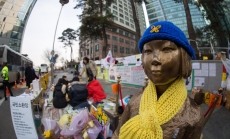The CPD Blog is intended to stimulate dialog among scholars and practitioners from around the world in the public diplomacy sphere. The opinions represented here are the authors' own and do not necessarily reflect CPD's views. For blogger guidelines, click here.
If Pakistan were a person, who would it be? Would it be Odysseus, undergoing a series of grueling tests in order to claim its true heroic identity? Would it be a hapless Sancho Panza, looking on with alarm as it’s dragged into ruin by the misadventures of those around it?
In 2004, when the Indian Ocean tsunami hit a number of countries, the coastal regions of Indonesia and Sri Lanka were devastated. Before the tsunami, the public opinion of the United States in these and surrounding Muslim countries was predictably low; however the huge efforts of US humanitarian aid immediately following as well as long after the crisis swayed public opinions that remained high even a year later in a follow-up poll.

A discussion of Japanese Foreign Minister Katsuya Okada's apology for Japan’s colonial occupation of Korea during World War II.
DOHA, QATAR --- In the beginning, there was The Speech.
After that, there was the letdown.
DOHA, QATAR --- When Hillary Clinton addressed the U.S.-Islamic World Forum here on Sunday night, she found the going smooth…until she hit the bump of Gaza. A group of religious leaders, whose spokesman was Cardinal Theodore McCarrick of Washington, D.C., asked why the Obama administration could not do more to help the beleaguered residents of Gaza, whose supplies of food, water, and medicine are barely at survival level.
APDS Blogger: Paul Rockower
As recording artists gather today to re-create ‘We Are the World,’ to benefit Haiti, one cannot help but be moved by America’s continued commitment to sending relief and embracing the world in a time of crisis. Americans from every walk of life, and every level of the economic spectrum, are finding ways to contribute to the relief efforts in Haiti.
The other day The Wall Street Journal ran a good summary of China’s conflict with Google. It looks like we’re in for another international war of words but, this time, it won’t be a classic Cold War confrontation over political-military issues, but rather a war of words over words — censorship, to be precise.
Pages
Visit CPD's Online Library
Explore CPD's vast online database featuring the latest books, articles, speeches and information on international organizations dedicated to public diplomacy.
POPULAR ARTICLES
-
January 29
-
January 20
-
January 28
-
January 2
-
January 8
Featured Blogger
Join the Conversation
Interested in contributing to the CPD Blog? We welcome your posts. Read our guidelines and find out how you can submit blogs and photo essays >.








